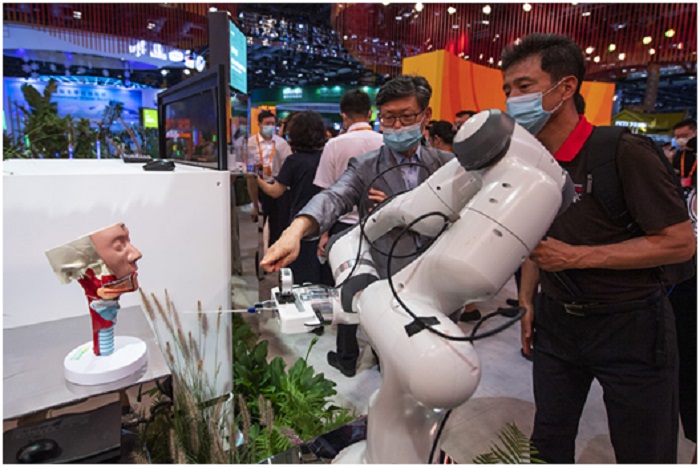



Sci-tech achievements drive the upgrade of service trade, and that’s indicated by the recently concluded 2021 China International Fair for Trade in Services (CIFTIS) in Beijing.
At the event, robots were seen everywhere showing their skills of coffee making, fitness training, dancing, construction surveying and surgical assistance. One of them that was really fascinating was a full-automatic nasopharyngeal swab sampling robot in the No. 1 Exhibition Hall of the China National Convention Center, one of the venues for the 2021 CIFTIS. The robot is able to take out a swab, determine sampling position and collect sample.
The 2021 CIFTIS was hi-tech-ish both in and outside the venues. The industrial remains at the Shougang Park, a steel mill in Beijing that was employed as the venue of the CIFTIS for the first time this year, formed a sharp contrast with the frontier sci-tech achievements exhibited.
When planning the event, CIFTIS organizers showed exhibitors around in Beijing to demonstrate the city’s sci-tech innovation and digital economic development, so as to help the latter explore more possibilities for development. The organizers also set up a special hall for exhibitors to launch their new technologies and achievements.
Digital technologies have been well exploited in the event to facilitate online and offline communication and negotiation. The 2021 CIFTIS improved nearly 40 functions of its online platform, breaking free of the restrictions of time and space. Such improvement has significantly improved the experience of exhibitors and visitors.
More importantly, the CIFTIS offered a window into new lifestyles and future production.
Technologies illuminate people’s lives. At the Education Services exhibition hall, a digital sand table was displayed. It was able to show contour lines on sand piles of any shape it builds, and thus make geographical learning much easier. At the Sports Services exhibition hall, there was an intelligent footpath that could track users’ fitness data and make proper management suggestions for its operators. Besides, a new program was unveiled at the Health Services exhibition hall, which is able to screen people for nearly 600 genetic diseases using a single heel prick blood sample. This program is conducive to the early screening, diagnosis and treatment of relevant diseases.
“Anything is possible. These techs will enjoy huge potential and embrace bright prospects,” said a visitor to the event.
Apart from people’s daily life, technologies are also driving industries. The maturing AI, cloud computing and block-chain technologies are injecting strong impetus into producer services, as well as the services concerning infrastructure and public environment.
An exhibitor brought its latest intelligent patrol system to the 2021 CIFTIS. The system backed by mixed reality (MR) virtualizes the operation of electromechanical devices at coalfaces for teaching purposes and is able to diagnose faults. Besides, the system can also assist troubleshooting from a distance.
Thanks to the system, real-time videos in coal mines can be sent to experts through mobile phones and other devices via the MR glasses worn by the workers, which makes the communication between work sites and management platforms more efficient, and reduces operation cost.
From smart construction systems to short and imminent weather forecast, and to contactless delivery, technologies are accelerating the transformation and upgrading of service trade and moving the sector onto a track of high-quality development.
Digital trade is becoming a new engine of economic growth, and the engine is ignited by science and technology. As a new round of sci-tech revolution and industrial transformation gathers momentum, sci-tech achievements are deeply integrated into the real economy and have an increasingly important influence on the quality of development.
In particular, the COVID-19 pandemic has significantly expanded the application scenarios of digital service trade, encouraging relevant industries to speed up innovation.
It is believed that independent innovation, as well as the new businesses, models and growth drivers expedited by digital technologies, will lead to better quality, higher efficiency, and more robust drivers of economic growth, and constantly enhance the competitiveness, innovation capability and risk resistance performance of the economy.
In this age of economic globalization, no country can achieve innovative development without the global innovation network. China has always shared its innovation results and development opportunities with the rest of the world, be it in the construction of the BeiDou Navigation Satellite System or in the exportation of anti-pandemic supplies and equipment.
Science knows no borders, and scientific cooperation enjoys promising prospects. Through the CIFTIS, more sci-tech achievements will be shared globally to create new space for development with cooperation and inject confidence into global recovery.
It is a reminder that only by constantly making scientific and technological progress and injecting new dynamism into traditional industries can countries achieve faster, higher-quality, and more efficient economic development.


The Executive and members of the.


The Acting Director, FCT Directorate of.


President Bola Ahmed Tinubu has been.



Barely a month after resignation of.


An Abuja based Legal Practitioner, Osuagwu.



Convener of Equitable Remedy, Mrs. Magaret.


Contractors handling the contract for city.


Nigerian government may have concluded plans.


The Diplomatic Correspondents Association of Nigeria.


A rights group, “Follow Me Talk.
Leave a Comment